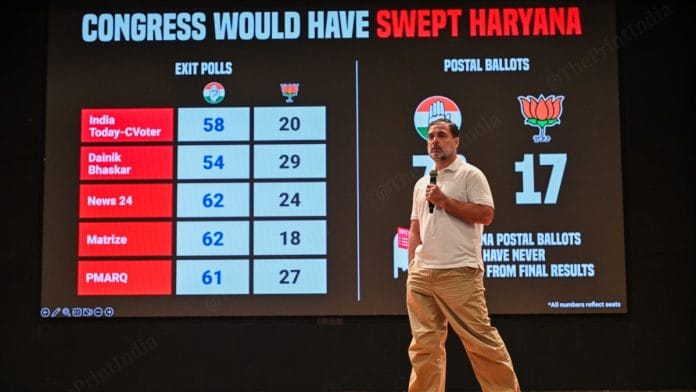It’s clear as daylight that the Guardian of Democracy, the Election Commission of India’s reaction to revelations of likely crores of fake voters in India’s electoral rolls is stonewalling, passive aggressiveness, filmy dialogues—and zero action.
Sections of the Indian media seem to have followed suit, using bold headlines—as The Indian Express did—to imply that the “Vote Chori” allegations are just hot air. Yet every news report investigating the alleged fake voters in Hodal district of Haryana, including, ironically, The Indian Express’ own reports, has backed up the Congress claim of glaring irregularities on the Haryana electoral roll.
On 5 November, Leader of the Opposition Rahul Gandhi used Election Commission of India (ECI) data to show that 25 lakh out of 2 crore voters in Haryana—one out of every eight voters—were dubious. These names were either (1) duplicated in many booths, seats and even states, or (2) had clearly invalid addresses or (3) were implausibly bulk voters at a single address. To illustrate the third case, Gandhi gave three examples of houses in Haryana where 66, 501 and 108 voters were registered.
Several media outlets promptly dispatched reporters to Haryana to check some of the claims and, as expected, found a whole lot of irregularities.
The first Indian Express report, dated 6 November, stated that the two addresses in Hodal district—House No. 150 (66 registered voters) and House No. 265 (501 registered voters)—actually were large plots containing multiple homes and families, implying that the Congress had got it wrong. A second article, dated 7 November, sought to contradict Gandhi on the points about duplicate voters by discovering that Charanjeet Kaur, whose photo appears next to 223 names on the roll, said she had voted only once. And that at least 17 of the voters whose names are associated with her photo were aware of this and had flagged the issue to the ECI.
There are several problems with taking this at face value.
Also read: Rahul’s ‘vote chori’ attack on EC is a political dead-end. He still has a point
Setting the record straight
First, other news reports contradict these confident assertions. A Dainik Bhaskar reporter found that there were only seven people in House No 265, and the owner, an ex-BJP Councillor, said his extended family has only 80 people. The members of this family told ThePrint that names of outsiders started getting added to this address on the voters’ list after 2016. It is obvious that a proper investigation—not that the ECI is showing any sign of doing one—is needed to get to the bottom of this.
Second, Congress is not claiming that Charanjeet Kaur is rigging elections. The obvious question is: How did 5,21,619 people vote when the photos on the rolls and on their IDs don’t match, as The Indian Express itself has confirmed? And the next question, naturally, is, how many of these are genuine voters? Recall that Haryana flipped with just 22,779 votes—less than 1 per cent of the 25,41,144 dubious entries on the ECI’s own lists.
Third, all the news reports show clear evidence that the ECI failed to implement rule 11.2.4(vii)(a) and rule 11.4.3 of the Manual on Electoral Rolls, which states that the “Assistant Electoral Registration Officer shall field check households with more than 10 electors”. Furthermore, there is no provision for registering voters in “plots”, only in houses. Indeed, a report by ThePrint states that the actual number of electors associated with House No 265 could be even higher, at 630.
To its credit, The Indian Express did report that the ECI had puzzlingly chosen not to use a de-duplication tool developed by the Centre for Development and Advanced Computing that it had successfully used to remove 3 crore duplicate entries in the annual Special Summary Revision of 2022. But the treatment of the Vote Chori allegations illustrates the danger of parachute journalism, casually ‘checking’ laborious counter research that took months to compile—research that is in fact the media’s job to do.
Just as it is the media’s job, and that of every citizen, to demand accountability from the ECI for our democratic processes, in which all Indians are equal stakeholders. Machine-readable electoral rolls and CCTV footage would be elementary transparency, but the ECI’s unconscionable denial has been given a pass in much of the media.
Opposition parties are doing the best they can, have gathered open-and-shut evidence, only to be met with silence and deflection. The discourse-setters seem to be actively ignoring the iceberg and what it portends for our future.
There can be no substitute for a genuine investigation into the growing mountain of evidence that India’s electoral rolls—notwithstanding the blather and obfuscation of Chief Election Commissioner Gyanesh Kumar—are deeply corrupted.
Amitabh Dubey is a Congress member. He tweets @dubeyamitabh. Views are personal.
(Edited by Theres Sudeep)







Because we, the Indian people have heard these unproved allegations for years: EVMs, Rafael, etc.
Andyou complain about poll lists based on photos while opposing the SIR meant to improve such lists
You and RaGa are just not credible
The Congress may have stolen votes for decades in the past, BJP is doing the same now. So, stop whining.